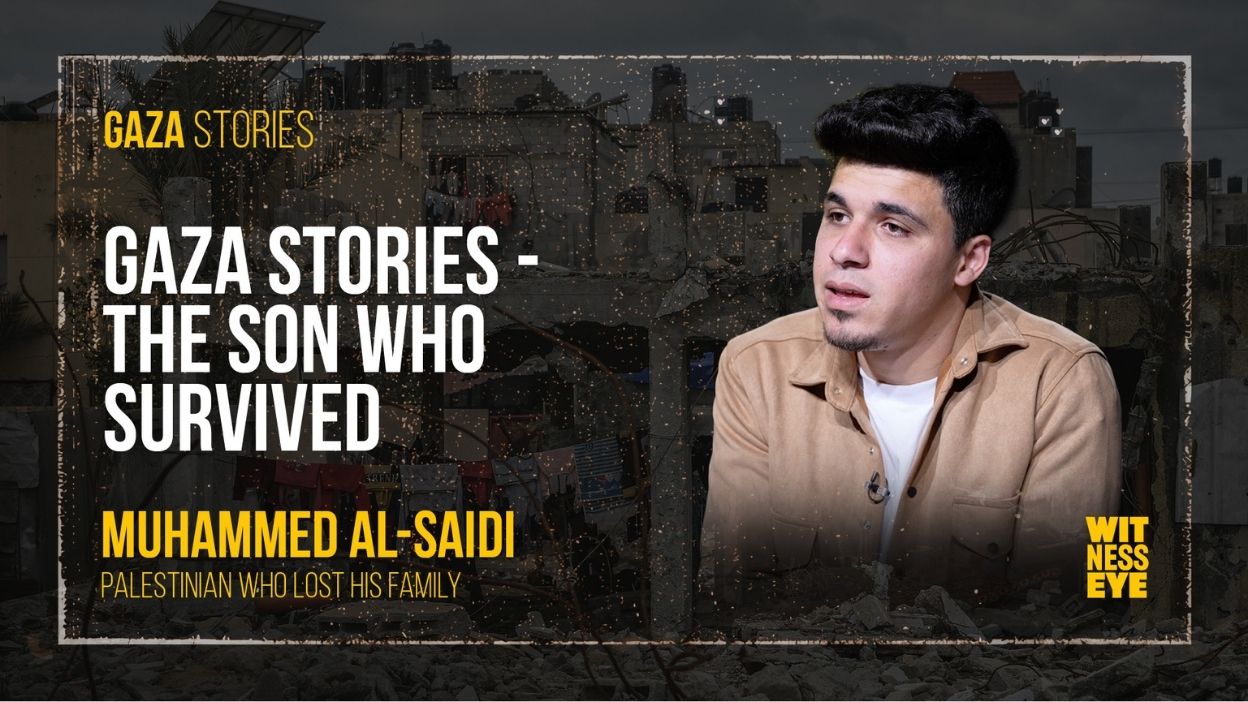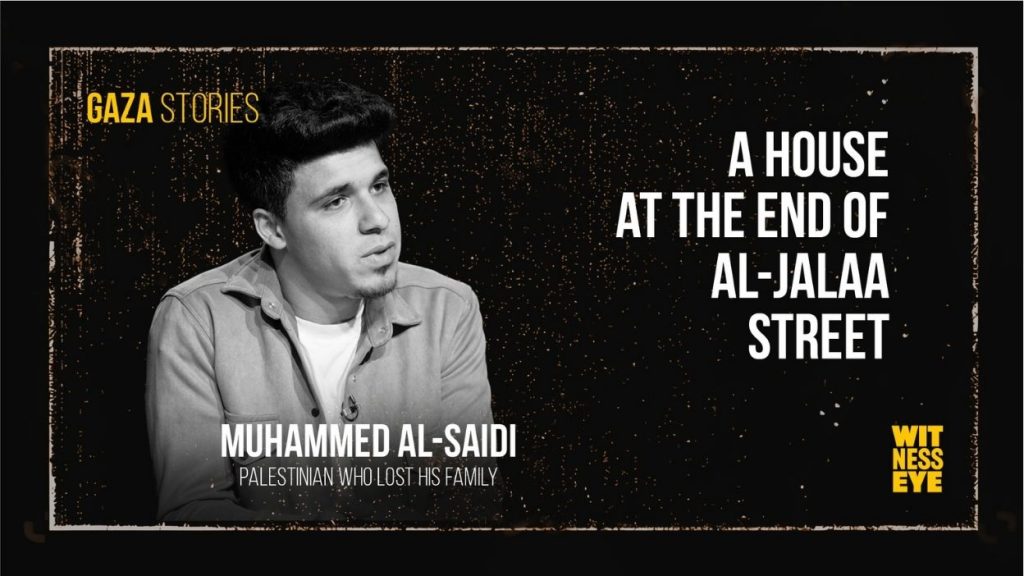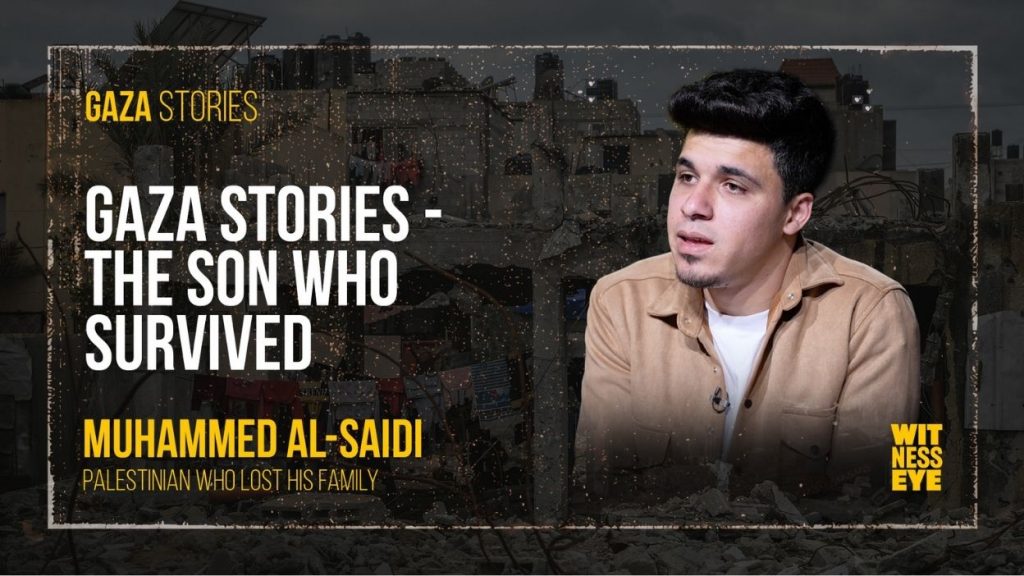
This is one of those Gaza Stories where survival itself becomes both a wound and a duty. Some losses don’t just change a family; they rewrite the very meaning of survival. For Muhammad Abu Nada, survival means carrying the memory of his father, two brothers, two sisters, and relatives who were killed when their home in Sheikh Radwan was bombed without warning. On that October night, his life split into two timelines: one buried under rubble in Gaza, the other forced into exile, where he remains the sole son left to tell their story. What remains is not only grief but a heavy inheritance—responsibility for his widowed mother, for a sister raising children in famine, and for preserving the truth of what happened.

A house at the end of Al-Jalaa Street
“When the call came, I didn’t believe it,” says Muhammad Abu Nada. “I had been reassured earlier: your family is fine.Then the words changed shape—the house that was targeted is your house.”
The home stood in Sheikh Radwan, at the end of Al-Jalaa Street in Gaza City. On October 23, 2023—two weeks into the Gaza War—a missile struck the building. Moments later, as neighbors rushed in, a second strike followed. “Civil defense said there was no way anyone could come out alive,” Muhammad says. The blast killed his father, two brothers, two sisters, an uncle and two cousins. At least 25 neighbors died in the same residential block. Some bodies were immediately visible under broken slabs of concrete, but heavy machinery could not reach them; other families in other streets had 60 and 70 people buried in place. “Who gets the bulldozer first?” he asks quietly. “Who gets priority in a city of ruins?”
“I left three months before the war”
Muhammad had departed Gaza three or four months earlier to pursue further study in Istanbul after graduating from Al-Azhar University. “I planned to rest a little, then enroll. I had dreams.” He laughs, not out of joy, but because the sentence itself felt impossible to finish. “Then the war came. All the plans dissolved in seconds.”
He is the only sibling abroad. At home, his father was a carpenter; one sister worked as a nurse at Al-Shifa Hospital and another as an Arabic teacher; one brother was in civil defense; another studied nursing. “We were a family of routine,” he says. “Work to home, home to work.” On October 23, Muhammad learned the house was hit only after a confused round of phone calls and misreported headlines naming neighboring families instead. “I saw their names—Nasrallah, Shehade—our neighbors. How do I tell my friend, who shares my room here, that his entire family might be gone?” Hours later a neighbor phoned: Check on your family. Then the confirmation arrived: The targeted house belongs to the Abu Nada family.
Gaza Stories – The last return home
In the days before the strike, an earlier warning had emptied a nearby home and sent Muhammad’s siblings into temporary displacement. “It turned out to be a fake warning,” he says. When the immediate fear subsided, his sisters, brothers, and uncles returned to Sheikh Radwan. Muhammad didn’t know they were back. “That night I finally reached my sister in northern Jabalia. I told her: ‘They targeted our house, but I don’t know who was inside.’ She said, ‘Shurouq and Heba went home today.’ She didn’t understand what she was saying.”
The line connected and dropped in waves. News stuttered across a broken grid. “At that moment,” he says, “they were already martyrs.”
The family that remains under the rubble
Two years on, most of Muhammad’s loved ones are still buried beneath their home. The place itself became a military operations zone; attempts by civil defense to retrieve bodies repeatedly failed. “Our family is visible,” he says. “People can see them. But no one can reach them.” One cousin was found and buried near the graves of Muhammad’s grandparents in a cemetery. Later, after the area was occupied and then vacated, that grave was gone too. “They dug up everything,” he says. “Even the dead cannot rest.”
For families who cannot lay their loved ones to rest, grief is suspended in a twilight state. “Part of me still tells myself they are alive,” he admits. “My mother, my sister—we all say this sometimes.”
That suspended grief is why Gaza Stories must be told not only to remember, but to establish traceable facts—crucial building blocks for War Crimes Documentation, Civilian Casualty Mapping, and eventual Legal Accountability Cases. The rubble is not just debris; it is an archive in ruin, an address that once held legal identity, inheritance, memory.

A mother and a sister, separated by siege
On October 8, the day after the war began, Muhammad’s mother fled north Gaza for Rafah. When the house was destroyed two weeks later, communications to Rafah had already collapsed. “My uncle and I tried to figure out who should tell her,” Muhammad recalls. “She has hypertension. We needed to take care.” A week passed. Finally his uncle told her. “Her first words were, ‘I want my children. Get me to Muhammad.’ I couldn’t speak to her that day. I didn’t want her to hear my weakness.”
His sister—who had been in northern Jabalia—survived, though her home was later erased. She moved through tents and temporary rooms from the coast to the Rimal district, always at the mercy of the next evacuation order. “She was displaced a hundred times,” Muhammad says. “They say the word displacement as if it’s a bus schedule. It’s a hundred lives, each cut off mid-sentence.”
Gaza Stories – Famine as a weapon
The word famine used to belong to another geography in Muhammad’s mind. Now it is intimate. During the months when aid was dropped by air, one pallet slammed onto his sister’s tent while she and her children slept. “By God’s mercy, they lived,” he says. She developed infections and dramatic weight loss—“from 110 kilos to 65”—and her children’s skin broke down for lack of clean water and soap. “She sent me pictures,” he says simply. “You could see their bones.”
The price of basic food items in the north reached what he calls “imaginary” levels. Even when he could send money, there was often nothing to buy, no cash to withdraw, and no safe path to collect it. “People talk about Destruction of Civilian Infrastructure,” he says. “They don’t understand that a shattered bank or a burned supermarket is also a destroyed lifeline.”
“All I want is a grave”
Muhammad’s dream life—study, work, help the family, return in December to celebrate his brother’s engagement—has contracted into two prayers: “To see my mother, and to have a grave for my family so I can recite Al-Fatiha.” He is twenty-something, but speaks with the exhaustion of a much older man. “I was the beloved one, the spoiled youngest,” he says with a sad smile. “Everyone worked; everyone helped me. Overnight I became the provider. I wasn’t ready. I’m still not ready.” He abandoned study plans to work and send what he can. “There’s no other provider but me,” he says. “If I study, who feeds my mother?”
This is the private math behind public numbers—how countless families have been thrust into premature responsibility, their future labor mortgaged to present survival. It is also why these Gaza Stories sit beside our Civilian Impact Reports and Genocide Evidence Files: testimony is not only remembrance; it is a ledger of obligations the world has yet to meet.
The meaning of “genocide” when you live inside it
“Before, genocide was a word,” Muhammad says. “Now I can’t imagine its meaning because it keeps expanding—killing, famine, disease, the erasure of past, present, and future.” He remembers the moment of cognitive rupture when a news anchor said 80% destruction. “Eighty percent means all of Gaza,” he says. “The other twenty percent is the sea and border areas with no houses.”
Numbers like that flatten people into statistics. “We’re not numbers,” he says. “Behind each martyr are a million dreams.” He gestures toward friends in Istanbul, some of whom lost entire family trees. “If something happens to one of them,” he says, “their whole lineage disappears from the registry.” That is not a metaphor. The paper record—the literal civil registry—has itself been blasted, burned, scattered. The fate of Gaza’s Missing is therefore a humanitarian crisis and a forensic one, demanding Digital Evidence Archive work, Social Media Evidence triage, and careful Forensic Investigations.
“Legendary resilience” and ordinary pain
From a distance, Palestinians are often framed as legendarily resilient. Muhammad winces at the phrase. “People in Gaza are not all patient,” he says. “Many are simply forced. They cling to the land because leaving means never returning.” He adds: “And if someone is a resistance fighter, he has chosen a path he understands. But they burned entire families—ours was a civilian home. We had no party, no militancy.”
Resilience, he suggests, is a surface that hides fractures. “On camera, maybe I did not cry. Inside, everything is broken.” He worries about a future in which that brokenness is inherited. “My grandchildren will hear what happened and carry a lump in the heart,” he says. That line echoes what so many of our contributors have told us in prior pieces like Gaza Stories: Final Words — Between Grief and Duty and Gaza Stories: Hossam’s Fight to Witness—the way grief becomes a curriculum.
The survivor’s calculus: Istanbul, work, remittances
“No one contacted me to document this professionally,” Muhammad says. “Expatriates are forgotten.” That absence of outreach is not trivial. War Crimes Documentation depends on collecting Eyewitness Testimonies from survivors both inside and outside Gaza. It is also why the Gaza Tribunal—including its Bosnia public session—and projects like Witness Eye are building a public record—see our report Gaza Tribunal’s First Public Session in Bosnia and the follow-up Gaza Tribunal Reports.
Meanwhile, Muhammad’s days are a ledger: hours of work, portions of income sent to a mother who stands in ration lines and navigates checkpoints without the sons who used to carry bags. “There’s no justice in this moment,” he says, when asked whether he believes in international justice. “The world knows right from wrong, but it lacks the strength to rule with justice.”
The legal conversation matters. International Humanitarian Law prohibitions on collective punishment, attacks on medical facilities, and starvation of civilians are not academic where Muhammad’s family lived; they are coordinates on a map. Questions of Military Conduct Analysis and whether actions constitute Crimes Against Humanity are not abstractions; they are the frame that either enables or restrains power. Naming those frames—alongside Gaza justice, Gaza legal review, and Gaza War Crimes—is part of the work we do here.

Gaza Stories – An inherited catastrophe
Muhammad’s family, like most in Gaza, descends from refugees—his roots in Bayt Jirja, a village close to the Strip. “Our grandparents suffered in 1948, and we suffer now,” he says. “It became inherited.” That sentence threads through other features in this series, from Gaza Stories: A Mother’s Last Words—A Family’s Goodbye to Gaza Justice: Voices of Justice and Grief from Gaza and our dossier Gaza’s Missing: Thousands Lost in the Shadow of War.
To stitch these threads, we maintain a Digital Evidence Archive, gather Social Media Evidence, and organize material in Gaza Tribunal evidence—work that complements Forensic Investigations. Testimonies like Muhammad’s help populate an Accountability Watchlist that extends from field units to decision-makers, including political leadership (Netanyahu), with an eye toward future Legal Accountability Cases.
A calendar of loss—and a ledger of names
“Behind every number is a person,” Muhammad says. “Behind each person are others—mothers, sisters, children—who become widows and orphans.” He is not interested in being heroic. He is interested in being heard. “We left Gaza to study, to help our families, to raise our country’s name,” he says. “We didn’t leave to escape. But now many of us outside are providers first, students second.”
We close this Gaza Stories entry the way we began: with the house at the end of Al-Jalaa Street and the people it held. Muhammad’s remaining wishes—“to meet my mother, and to have a grave”—are modest requests in a time of enormity. They are also demands that law and conscience should recognize. As we continue to collate Gaza Tribunal Reports, expand Genocide Evidence Files, and lift up Stories of Survival, we ask readers to hold the contours of this specific life in mind.
If you want more context and to hear from other voices, explore our related reporting:
– Gaza Stories: Journalist, Exile, War
– Gaza Stories: A Test for Humanity — Part 1 and When Law Collapses — Part 2
– Lost Over 90 Family Members: Story of Dr. Rinad Al-Majdalawi
Each of these Gaza Stories adds weight to the scales of international justice. Each is a small light kept alive in the Digital Evidence Archive. And each is a reminder that documentation and solidarity are not opposites, but twin labors.
Stay Connected with Witness Eye
Follow us on our official channels:
